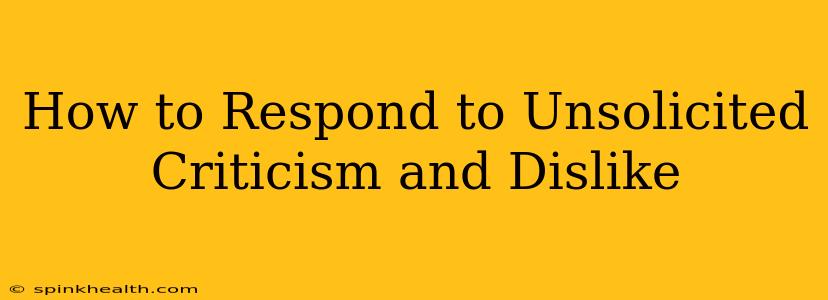Unsolicited criticism and dislike can sting, especially when it comes from unexpected sources. Whether it's a harsh review of your work, a negative comment on social media, or a pointed remark from a colleague, learning how to navigate these situations gracefully is crucial for your well-being and professional success. This guide offers strategies for responding effectively and maintaining your composure.
Why Do People Offer Unsolicited Criticism?
Understanding the motivations behind unsolicited criticism can help you respond more constructively. Sometimes, it stems from genuine concern, a desire to help you improve, or a simple misunderstanding. Other times, it might be rooted in personal biases, jealousy, or a need to assert dominance. Recognizing the potential root causes can help you tailor your response.
How to Respond to Negative Feedback
The best approach depends heavily on the context. A casual comment from a friend differs greatly from a formal professional review. However, several key principles remain consistent:
1. Listen and Validate (Even if You Disagree):
Before formulating a response, take a moment to truly listen to the criticism. Acknowledge the person's feelings and perspective, even if you don't agree with their assessment. A simple, "I understand your perspective," or "Thank you for sharing your thoughts," can go a long way in diffusing tension.
2. Assess the Criticism's Validity:
Is there any merit to the criticism? Be honest with yourself. Constructive criticism, even if delivered poorly, can offer valuable insights for growth. Identify any areas where improvement is possible.
3. Choose Your Response Wisely:
Avoid reacting defensively or emotionally. Take a deep breath and choose your words carefully. Consider the following options:
- Ignoring the Criticism: Sometimes, the best response is no response at all. If the criticism is unfounded or comes from a clearly biased source, ignoring it might be the most effective strategy.
- Acknowledging and Moving On: A simple, "Thank you for your feedback," can suffice if the criticism isn't constructive or warrants a deeper response.
- Seeking Clarification: If the criticism is unclear or vague, politely ask for clarification. "Could you elaborate on what you mean by...?"
- Offering a Balanced Response: If the criticism is valid, acknowledge the point and offer a reasoned response. Explain your reasoning or perspective without getting into a lengthy argument.
- Setting Boundaries: If the criticism is overly aggressive or disrespectful, set clear boundaries. "I appreciate your feedback, but I'm not comfortable with the tone of this conversation."
4. Focus on Solutions:
Instead of dwelling on the negative, shift the conversation towards finding solutions. If the criticism highlights an area for improvement, discuss potential strategies for addressing the issue.
5. Disengage if Necessary:
If the conversation becomes unproductive or overly aggressive, disengage politely. You are not obligated to engage in every negative interaction. Prioritizing your mental health is crucial.
What if the Criticism is Public (e.g., Online Reviews)?
Responding to public criticism requires a different approach. Consider these points:
- Maintain Professionalism: Avoid getting into an online argument. Keep your responses calm, factual, and professional.
- Address Concerns Directly: If the criticism highlights a valid issue, address it directly and offer a solution.
- Don't Engage with Trolls: Ignore comments that are clearly intended to provoke or harass.
- Highlight Positive Reviews: If you have many positive reviews, highlight them to balance the negative ones.
How to Deal with Dislike and Rejection
Dislike and rejection are inevitable aspects of life. It's important to develop healthy coping mechanisms to manage these experiences:
- Self-Compassion: Treat yourself with kindness and understanding. Remember that everyone experiences rejection at some point.
- Perspective: Try to put the situation in perspective. Not everyone will like you or your work, and that's okay.
- Focus on Your Strengths: Focus on your accomplishments and positive attributes.
- Learn from Mistakes: Use negative experiences as opportunities for growth and learning.
Frequently Asked Questions (FAQs)
How do I respond to someone who is being personally critical?
If the criticism is personal and irrelevant to your work or actions, it's often best to disengage or set boundaries. A simple, "I'm not comfortable with this conversation," can be effective.
Should I always respond to criticism?
No. Sometimes, ignoring criticism is the best course of action, especially if it's unfounded or comes from a hostile source.
How can I improve my ability to handle criticism?
Practice self-awareness, develop strong communication skills, and build resilience. Consider seeking professional guidance if you consistently struggle to manage criticism.
By implementing these strategies, you can navigate unsolicited criticism and dislike with grace, resilience, and a focus on positive growth. Remember, your response is a reflection of your character and professionalism. Choose wisely.

